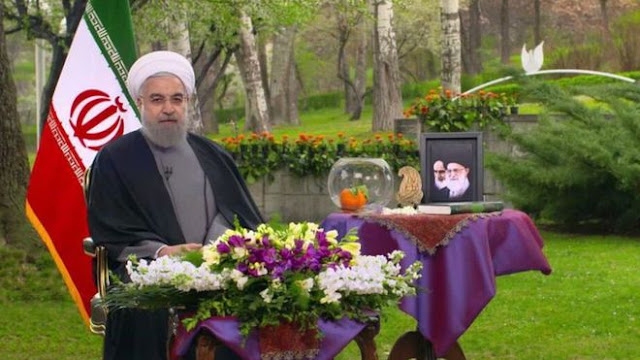Persian New Year, or Nowruz, meaning “new day”, has been celebrated for thousands of years by individuals in much of Caucasus, Central Asia and the Middle East. Historically, the holiday’s ability to transcend the boundaries of countries and religions has come as both a blessing and a curse, as it has the power to either unite or divide groups of people; this year’s Nowruz has already proven to be no exception.
In New York yesterday, UN Secretary-General Ban Ki-moon focused on the “inspiration” that March 21st, the International Day of Nowruz, is often acknowledged for: “Nowruz is an ancient celebration that predates today’s borders and divisions. It is a reminder that national boundaries, religious faiths and other superficial differences are not as important as our common humanity. In that way, Nowruz breaks down barriers and builds bonds of trust.”
The bonds of trust he described were found in some celebrations this year, but certainly not all:
In Iran, President Hassan Rouhani forewent tradition and replaced the goldfish typically found on the Nowruz Haft Seen table display with an orange, a gesture indicating his support of those opposed to the practice of keeping and then releasing the fish, usually to their death. His action has been received online with both praise and criticism: animal rights activists were pleased, but others argued it was a thinly veiled attempt to gain popular support.
In Afghanistan, not only has the fear of suicide bombing and the Taliban undermined the picnicking that typically accompanies Nowruz, some imams are campaigning against the holiday altogether on the grounds that it predates Islam. According to the BBC’s Auliya Atrafi, social media has the power to worsen the situation, “Many believe that this puritanical thinking is the product of the Salafi school of thought, spreading throughout the world with the help of imams, social media and backed by Saudi oil money. So whether a young man lives in Herat, London or Helmand, an internet search will produce the same conservative anti-Nowruz messages.”
In Turkey, Nowruz was welcomed in some places, but not others. In Diyarbakir, thousands came together to celebrate the holiday, but the mostly Kurdish crowd also used the opportunity to protest the arrest of Abdullah Ocalan, leader of the Kurdistan Workers’ Party. In Ankara and Istanbul, celebrations were prohibited altogether. Turkey as a whole is a far cry from the “common humanity” Nowruz promotes: in the last week alone, a suicide bombing killed 37 people in Ankara, a car bomb was found in Diyarbakir, and a suicide attack in Istanbul claimed the lives of 4 individuals.
For 3000 years, Nowruz has asked its followers to mark the first day of Spring in solidarity and peace. SumRando applauds those individuals who have found ways—public or private—to carry out this tradition, despite the difficulties that stand in their way.
Want the latest freedom of speech and cybersecurity news from around the world? Read on!
In New York yesterday, UN Secretary-General Ban Ki-moon focused on the “inspiration” that March 21st, the International Day of Nowruz, is often acknowledged for: “Nowruz is an ancient celebration that predates today’s borders and divisions. It is a reminder that national boundaries, religious faiths and other superficial differences are not as important as our common humanity. In that way, Nowruz breaks down barriers and builds bonds of trust.”
The bonds of trust he described were found in some celebrations this year, but certainly not all:
In Iran, President Hassan Rouhani forewent tradition and replaced the goldfish typically found on the Nowruz Haft Seen table display with an orange, a gesture indicating his support of those opposed to the practice of keeping and then releasing the fish, usually to their death. His action has been received online with both praise and criticism: animal rights activists were pleased, but others argued it was a thinly veiled attempt to gain popular support.
In Afghanistan, not only has the fear of suicide bombing and the Taliban undermined the picnicking that typically accompanies Nowruz, some imams are campaigning against the holiday altogether on the grounds that it predates Islam. According to the BBC’s Auliya Atrafi, social media has the power to worsen the situation, “Many believe that this puritanical thinking is the product of the Salafi school of thought, spreading throughout the world with the help of imams, social media and backed by Saudi oil money. So whether a young man lives in Herat, London or Helmand, an internet search will produce the same conservative anti-Nowruz messages.”
In Turkey, Nowruz was welcomed in some places, but not others. In Diyarbakir, thousands came together to celebrate the holiday, but the mostly Kurdish crowd also used the opportunity to protest the arrest of Abdullah Ocalan, leader of the Kurdistan Workers’ Party. In Ankara and Istanbul, celebrations were prohibited altogether. Turkey as a whole is a far cry from the “common humanity” Nowruz promotes: in the last week alone, a suicide bombing killed 37 people in Ankara, a car bomb was found in Diyarbakir, and a suicide attack in Istanbul claimed the lives of 4 individuals.
For 3000 years, Nowruz has asked its followers to mark the first day of Spring in solidarity and peace. SumRando applauds those individuals who have found ways—public or private—to carry out this tradition, despite the difficulties that stand in their way.
Want the latest freedom of speech and cybersecurity news from around the world? Read on!
SumRando Cybersecurity is a Mauritius-based VPN, Web Proxy and Secure Messenger provider. Surf secure and stay
Rando!


No comments:
Post a Comment